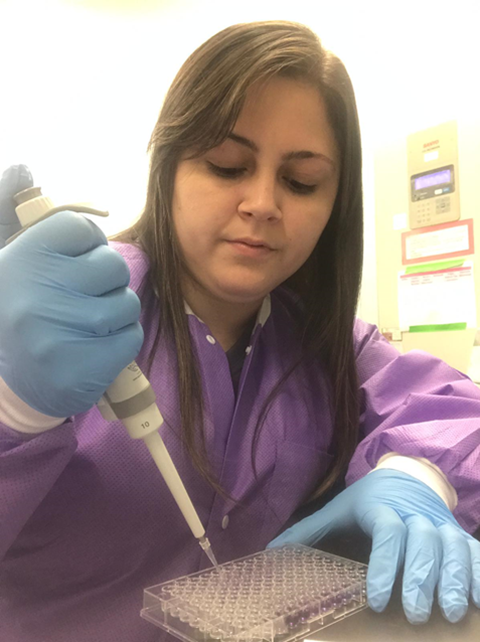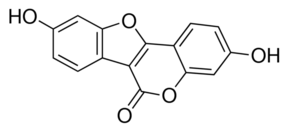Cracking foods’ anti-cancer properties
What if patients with breast cancer could consume legumes, such as soy sprouts, and greatly reduce the chances of their cancer metastasizing? This is one of the questions researchers at the University of Puerto Rico at Río Piedras are interested in answering, and their work already has yielded some intriguing findings, which will be presented Tuesday in Philadelphia at the annual meeting of the American Society for Biochemistry and Molecular Biology.

Graduate student Keishla M. Rodríguez–Mártir is working on her dissertation in the lab of Esther Peterson–Peguero. Rodríguez–Mártir is studying coumestrol, a phytoestrogen similar in structure to estrogen and found in foods such as soy, alfalfa, clover and Kala chala (a type of chickpea), among others. She aims to determine if coumestrol has anti-cancer effects in triple-negative inflammatory breast cancer, or TN-IBC, cell lines as it does in other cancer cell lines.
Rodríguez–Mártir’s dissertation research idea sprang from a project she was involved in as an undergraduate student at the University of Puerto Rico at Aguadilla, where she was assessing tamarind’s antibacterial properties.
“(This property) always called my attention — how something that we can buy at the grocery store works against bacterial infections,” she said. “This was something I was interested in exploring. (I wondered if) people receiving chemotherapy could supplement their treatment with something natural and accessible to them.”
Triple-negative breast cancer does not have estrogen or progesterone receptors, and it has low-to-no HER2 protein production. As a result, it cannot be treated with hormone or HER2-targeted therapy.

The inflammatory aspect of TN-IBC further complicates clinical outcomes, because it does not present with lumps but instead creates redness and inflammation and thus may not show up on a mammogram. This presentation causes doctors to explore other possible noncancerous causes first, which ultimately delays cancer detection. By the time it is diagnosed, it usually has metastasized and consequently results in a worse prognosis for the patient.
Rodríguez–Mártir dived into the scientific literature and came upon studies of phytoestrogens and their relationship to reduced risk of death and disease recurrence in women with breast cancer. Specifically, she focused on coumestrol because published data suggest that it has cytotoxic effects against triple-negative cell lines, but it had not been studied yet in the context of triple-negative inflammatory breast cancer.
Rodríguez–Mártir first sought to test the hypothesis that coumestrol could have cytotoxic effects on TN-IBC cell lines by using a 2D cell-culture model of TN-IBC cells. She conducted dose-response assays with coumestrol to determine half-maximal inhibitory concentration, followed by cell viability, migration and invasion assays, complemented by assessment of downstream signaling following coumestrol treatment.
She determined that coumestrol decreases cell viability, migration and invasion in TN-IBC cell lines. She also demonstrated that coumestrol downregulates pro-oncogenic signaling and upregulates genes involved in breast cancer suppression.
“Studies have determined that Asian and vegetarian women with high phytoestrogen dietary consumption have a low rate of incidence of breast cancer. Further, Chinese women who have breast cancer and consume phytoestrogens have a significantly lower mortality rate than their counterparts who do not,” she said. “I would like to identify a natural compound that (patients) can easily consume to support their therapy.”
Keishla M. Rodríguez–Mártir will present this research at 1:10 p.m. Tuesday, April 5, in Exhibit/Poster Hall A–B, Pennsylvania Convention Center (Poster Board Number A310) (abstract). In addition, the next step in her project, 3D models using matrigels, will be presented at the same time by her undergraduate colleague Ayeisha Colón–Ortíz (abstract).
Enjoy reading ASBMB Today?
Become a member to receive the print edition four times a year and the digital edition monthly.
Learn moreGet the latest from ASBMB Today
Enter your email address, and we’ll send you a weekly email with recent articles, interviews and more.
Latest in Science
Science highlights or most popular articles

Building a career in nutrition across continents
Driven by past women in science, Kazi Sarjana Safain left Bangladesh and pursued a scientific career in the U.S.

Avoiding common figure errors in manuscript submissions
The three figure issues most often flagged during JBC’s data integrity review are background signal errors, image reuse and undeclared splicing errors. Learn how to avoid these and prevent mistakes that could impede publication.

Ragweed compound thwarts aggressive bladder and breast cancers
Scientists from the University of Michigan reveal the mechanism of action of ambrosin, a compound from ragweed, selectively attacks advanced bladder and breast cancer cells in cell-based models, highlighting its potential to treat advanced tumors.

Lipid-lowering therapies could help treat IBD
Genetic evidence shows that drugs that reduce cholesterol or triglyceride levels can either raise or lower inflammatory bowel disease risk by altering gut microbes and immune signaling.

Key regulator of cholesterol protects against Alzheimer’s disease
A new study identifies oxysterol-binding protein-related protein 6 as a central controller of brain cholesterol balance, with protective effects against Alzheimer’s-related neurodegeneration.

From humble beginnings to unlocking lysosomal secrets
Monther Abu–Remaileh will receive the ASBMB’s 2026 Walter A. Shaw Young Investigator Award in Lipid Research at the ASBMB Annual Meeting, March 7-10 in Washington, D.C.

